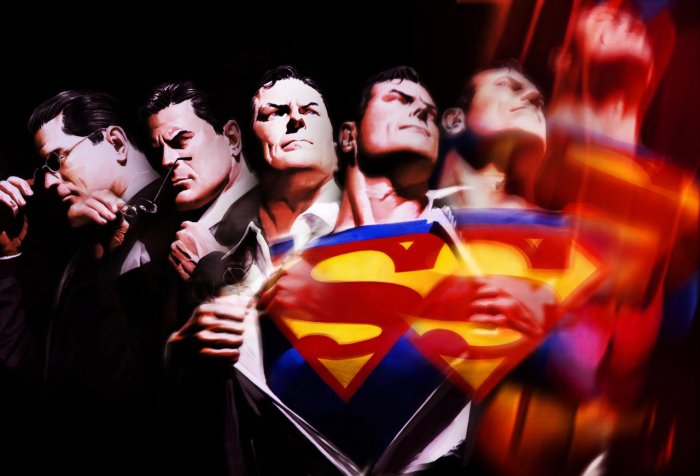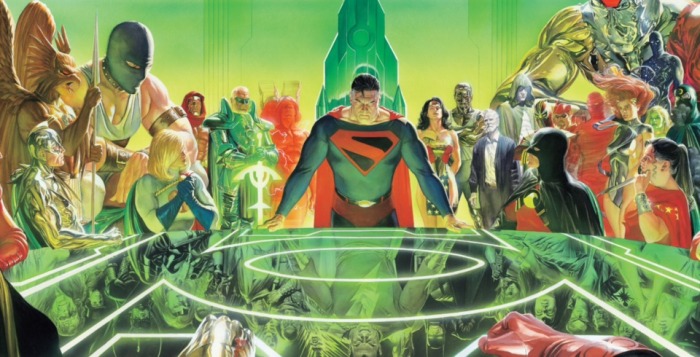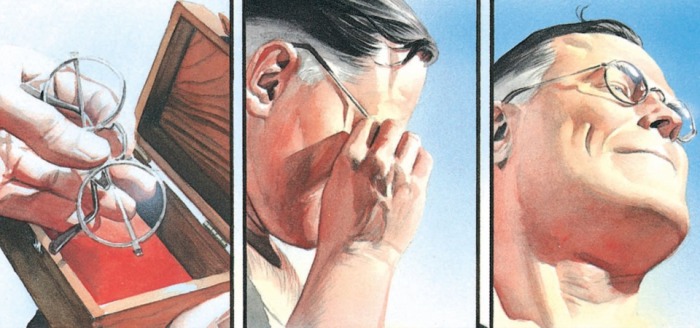
In my last post, I penned a brief historical survey of the various ways in which different writers employed the Christ-figure motif and the Messianic Archetype to the character of Superman. With the recent developments that have taken place in the “Truth” storyline, I find now to be the perfect occasion for which to focus in on the aspect of Superman’s character that has most benefited from these tropes: the secret identity.
In his original incarnation, Siegel and Shuster made it quite clear that Clark Kent was merely a useful disguise for the real persona, Superman. While alternate interpretations on the manner in which the dual identities of Clark Kent and Superman relate to each other have been explored throughout the years, it seems to be a quite recent development that the paradigm as a whole began to be regarded as too passé for modern sensibilities. Zack Snyder’s 2013 Man of Steel made no effort to play with this dynamic, only introducing Clark’s glasses in the final minute of the film, at which point Lois Lane had already known Clark to be Superman for most of its runtime. Subsequently, DC Comics’ post-Convergence relaunch followed suit with the “Truth” storyline, in which point the secret identity is finally exposed to the world at large.
Many fans immediately hailed jettisoning the secret as DC finally shedding a relic of a more childish age comics, a necessary change which had been a long time coming. However, regardless of its plausibility, the secret identity is the very magic that makes the character work, probably in a way that his Jewish creators had never conceived. Far from Clark being the way in which Superman becomes a relatable character to the reader (he is not a relatable character nor should he be), Clark Kent is how Man becomes relatable to Superman. Clark Kent is not Superman’s identity as a man, but rather his identification with Man. “Clark” is a daily exercise in humility for the individual for whom that virtue is more important than for anyone else. After all, Superman’s greatest power, the one which truly elevates him above us and defines him as a hero, is not his strength but his self-restraint. A man who can do anything is defined as much by what he chooses not to do as by what he does.
These pre-existing character traits are what made it so natural, even inevitable, for later writers to reimagine Superman as a Christ-figure. In the Christian scriptures and orthodox theology, Jesus is defined by his dual identity; he is fully God and fully man. To further drive the comparison, while that fact is always true, there are times at which he places one guise before the other. Christ’s first coming is defined primarily of his Humiliation, a doctrine regarding the fullness to which he temporarily forsook his divine attributes such as omnipotence and omniscience in order to fully identify with human frailty, submitting himself to fatigue, hunger, thirst, suffering, and death. This is the Jesus of modern-day popular imagination, a mild-mannered moral-teacher, a perfect pacifist beyond even Gandhi and Dr. King.

The complementary attribute, associated primarily with Christ’s Second Coming, is his Exaltation, in which his divinity is more fully expressed. Descending from the heavens in power, destroying the world in fire, judging the inhabitants of the earth, condemning the unregenerate to eternal perdition, reigning as king over a new creation… the Christ of apocalyptic lore is a far cry from the image of the gentle shepherd, but is equally attested to in the Christian Bible. Glimpses of this Exaltation are given throughout the narratives of Jesus’ life: calming the storm, walking on water, the Transfiguration, the Resurrection and Ascension. In these private moments among his closest friends, God in his secret identity as a man begins to take off his glasses and lets his hair down into a split-curl.
This same dichotomy of Exaltation balanced out by Humiliation is an essential element of the Superman mythos, as evidenced by the stories in which the Clark Kent persona is abandoned or never taken up to begin with. Time and again in Imaginary Stories and Elseworlds, when Superman is not Clark Kent, his daily exercise in Humiliation, he is left only in Exaltation; he quickly begins to resemble less the kindly Jesus of the Gospels and more wrathful Christ of Revelation, leaving humans in such stories sinners in the hands of an angry Superman.
In Injustice: Gods Among Us, Clark Kent for all intents and purposes dies with Lois and their unborn child. Subsequently, Superman turns from helping humanity to tyrannically ruling over it. Alternatively, in Red Son, Superman never adopts a Clark Kent-like identity. He is quickly assimilated into the Soviet war machine and, as in Injustice, his rise to ruler results in slowly descending into despotism as he robs dissidents of even their free will.
The classic example of such, however, is in Mark Waid and Alex Ross’ seminal miniseries Kingdom Come, which wears its Biblical allusions and Christ-imagery on its sleeve. It tells the story of the Second Coming of Superman, but only Superman; Clark is every bit as gone as Lois, Jimmy, Perry, and the Kents. Going by his Kryptonian name Kal, he has abandoned both humanity and his humanity, absconding for over a decade to the solitude of his Fortress, and surmising the lose that he had suffered with a curt, “Earthlings die.”
Lacking the Humiliation of Clark, he returns not as a friend and a reporter, but as a ruler. He seats himself on an emerald throne in the heavens above, and on the earth below damns his enemies to imprisonment in a Gulag, his every action placing mankind on the path to Armageddon.

Just as he is about to truly bring his wrath upon mankind, the audience surrogate, a minister by the name of Rev. McKay, interjects with the aesop Waid had been driving the series towards. Addressing him as Clark, McKay states, “Of all the things you can do, of all your powers, the greatest has always been your instinctive knowledge of right and wrong. It was a gift of your own humanity… But the minute you made the Super more important than the Man… that completely cost you your instinct.”
In that moment, Superman relearns the value of Humiliation which Clark Kent embodied, promising, “The problems we face still exist. We’re not going to solve them for you, we’re going to solve them with you, not by ruling above you, but by living among you. We will no longer impose our power on humanity. We will earn your trust.”
It is absolutely significant that the first time in the miniseries in which he permits someone to call him Clark, the name of his human identity, is the exact moment in which he begins to once again identify with humans.
In one of the best lines of the ‘78 Superman movie, the ghostly voice of Jor-El explains, “They can be a great people, Kal-El, they wish to be. They only lack the light to show the way. For this reason above all, their capacity for good, I have sent them you, my only son.” Indeed, not just within the universes of the comics and films, but our own as well, the character of Superman has been a light to show the way, inspiring real people to achieve more of the good which they’re capable of. Yet right as we may be in aspiring to one day be like Superman in every aspect, to accomplish wonders and join him in the sun, that day is not today. But in the here and now there is indeed one way in which we can daily emulate him, and that is to emulate mild-mannered Clark Kent. Clark is the answer to the question, “What would Superman do?” It is that empathy and humility which is the real secret of Superman’s identity.

All images above are by Alex Ross



Pingback: Superman: American Alien #5 | The Hub City Review
Pingback: Superman: American Alien #5 | The Hub City Review
Pingback: Superman: American Alien #6 | The Hub City Review
Pingback: Action Comics #960 | The Hub City Review
Pingback: Action Comics #964 | The Hub City Review
Pingback: Supergirl: Being Super | The Hub City Review
Pingback: The Eleven Best Dating Tips for “Geeks”(You Won’t Find Anywhere Else Online) | The Hub City Review
Pingback: NYCC Friday: ComiXology, Theology, Some Booze, and a Bit of Poison… | The Hub City Review
Pingback: Justice League is Dumb Fun, for Better and for (mostly) Worse | The Hub City Review
Pingback: The Real Blaspheme of Mark Russell’s “Second Coming” | The Hub City Review